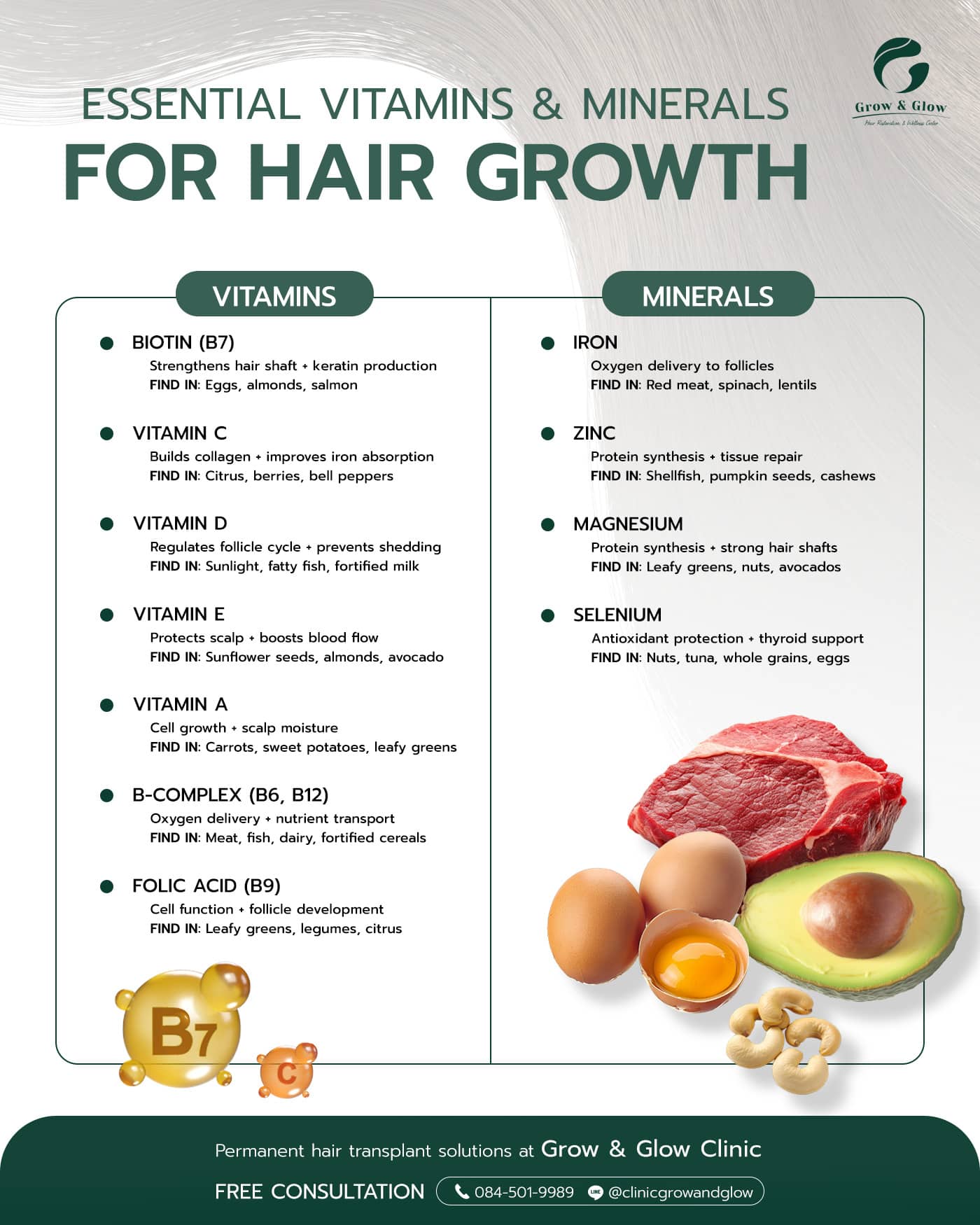
Vitamins and Nutrients to Promote Hair Growth & Prevent Hair Loss
Thinning hair and brittle strands can be caused by various factors, from genetics to hormones and external stressors. Nutritional deficiencies can also cause weak or thinning hair. This post will discuss how nutrients, such as certain vitamins and minerals, can support the natural hair growth cycle and improve hair thickness, strength, and luster.

If you have advanced hair loss or thinning that’s unresponsive to home remedies, we’ll explain why you should see hair specialists at Grow & Glow Hair & Beauty Center for a personalized hair restoration plan, which may include a DHI hair transplant at our clinic.
The Role of Nutrition in Hair Health
Hair loss, thinning, and breakage can stem from various causes, such as hormonal imbalances, medical conditions, stress, aging, and harsh styling practices. However, vitamin or mineral deficiencies can also weaken the hair shaft, slow growth, or lead to excessive hair fall.
The hair growth cycle depends on a consistent supply of nutrients. Without key vitamins and minerals for hair growth and thickness, follicles may become dormant or produce weaker strands. One of the most effective ways to maintain long-term hair health is to support your hair from the inside out through proper nutrition.

Vitamins That Support Hair Growth
Biotin (Vitamin B7)
Biotin is among the most commonly recommended vitamins for hair growth. Biotin helps convert nutrients into energy and plays a direct role in strengthening the hair shaft. It supports keratin production, a protein that forms the structure of hair. Signs of biotin deficiency include hair thinning and dry scalp. Eggs, almonds, walnuts, sunflower seeds, spinach, liver, and salmon are good sources of biotin.
Vitamin C
Vitamin C plays an important role in collagen production, a structural protein that supports hair strength. It also improves iron absorption, a vital mineral for healthy hair growth, and acts as an antioxidant to protect hair follicles from oxidative stress. Citrus fruits, berries, broccoli, and bell peppers are good sources of vitamin C.
Vitamin D
Vitamin D is essential for regulating the hair follicle cycle. Low levels of vitamin D are associated with hair shedding and autoimmune-related hair loss, such as alopecia areata. Our bodies produce vitamin D primarily through exposure to sunlight. Common sources also include fortified milk and foods, mushrooms, egg yolk, and fatty fish such as salmon and tuna.
Vitamin E
This antioxidant helps protect the scalp from oxidative stress and inflammation, which can hinder healthy hair growth. It also supports blood flow to the scalp, allowing nutrients to reach hair follicles more effectively. Eating vitamin E-rich foods like sunflower seeds, almonds, spinach, and avocado can help improve scalp condition and hair density when combined with other nutrients like biotin.
Vitamin A
All cells, including hair, need vitamin A to grow. It also supports sebum production, which keeps the scalp moisturized and healthy. Sources of vitamin A include carrots, sweet potatoes, leafy greens, and mangos. However, too much vitamin A can also cause hair loss, so balance is key. Avoid over-supplementing without medical guidance.
B-Complex (B12 and B6)
B-complex vitamins, especially B12 and B6, help carry oxygen and nutrients to the scalp and hair roots through red blood cell production. Symptoms of B12 and B6 deficiencies include dull hair, slow growth, and scalp dryness, and are common in people with dietary restrictions. These vitamins can be found in meat, poultry, fish, dairy, fortified cereals, and legumes.
Folic Acid (Vitamin B9)
Folic acid aids in tissue growth and cell function, which supports hair follicle development and healthy hair growth. It can be found in leafy greens, legumes, whole grains, and citrus fruits.
Minerals That Promote Healthy Hair Growth
Iron
Iron is crucial for oxygen delivery to cells, including hair follicles. A deficiency of iron can disrupt the hair growth cycle and lead to increased shedding. Red meat, spinach, tofu, lentils, and fortified cereals are good sources of iron.
Zinc
Zinc plays a key role in protein synthesis and tissue repair, including hair follicle development and function. A zinc deficiency may cause delayed growth, thinning, or hair breakage. Sources of zinc include shellfish, beef, pork, poultry, pumpkin seeds, and cashews.
Magnesium
Magnesium helps regulate calcium levels and supports protein synthesis, which are important for strong hair shafts and healthy scalp conditions. You’ll find magnesium in leafy greens, avocados, nuts, and beans.
Selenium
This trace mineral, found in nuts, tuna, whole grains, and eggs, helps the body produce antioxidants that protect hair follicles from damage. It also supports thyroid function, which indirectly impacts hair health.
Should You Take Supplements for Hair Growth?

Eating a nutrient-rich diet is the best way to support hair growth, but sometimes, food sources aren’t enough. Individuals with digestive issues, chronic illnesses, or restricted diets may be less able to absorb certain vitamins and minerals, which can affect hair growth. However, it’s best to consult a medical practitioner before including these vitamins and minerals through supplementation.
Professional Advice & Treatment for Hair Loss
We recommend a consultation at Grow & Glow Hair & Beauty Clinic, where our hair experts take a clinical approach to addressing your concerns. They’ll conduct a thorough diagnosis of the causes and provide nutritional guidance and a tailored plan for vitamin and mineral supplementation that may be required for hair growth. Our doctors will also monitor your progress to avoid unwanted side-effects.
Combined care options for hair restoration of thinning hair, such as topical treatments, oral supplements, and advanced procedures like hair transplantation, may be considered for optimal results. Contact Grow & Glow Hair & Beauty Center for a consultation.
References:
- Guide to Best Vitamins and Minerals for Hair Growth. Retrieved on 31 July 2025 from https://ishrs.org/patients/treatments-for-hair-loss/nutrition-and-vitamins/
- Vitamins, minerals, and hair loss: Is there a connection? Retrieved on 31 July 2025 from https://www.health.harvard.edu/diseases-and-conditions/vitamins-minerals-and-hair-loss-is-there-a-connection


